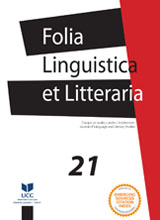LEARNING MORE FLS, LEARNING ENGLISH OUTSIDE OF SCHOOL AND GENDER CORRELATED WITH SUCCESS, BELIEFS AND LANGUAGE LEARNING STRATEGIES
LEARNING MORE FLS, LEARNING ENGLISH OUTSIDE OF SCHOOL AND GENDER CORRELATED WITH SUCCESS, BELIEFS AND LANGUAGE LEARNING STRATEGIES
Author(s): Magda PašalićSubject(s): Foreign languages learning, Language acquisition, Evaluation research
Published by: Filološki fakultet, Nikšić
Keywords: foreign languages; success in English as a foreign language; beliefs about language learning; language learning strategies; gender;
Summary/Abstract: Research results presented and interpreted in the paper include the analysis of the correlation between affective and cognitive factors relevant in the process of the Second Language Acquisition (SLA) and for the progress and performance students achieve in English as a foreign language (EFL). One affective factor, beliefs about language learning, and one cognitive factor, language learning strategies (LLS), have been correlated with the following factors: success in EFL, gender, learning English outside of school and learning other foreign languages (FLs). The research results and their interpretation should help scholars in the area of SLA find answers to the question why some students achieve better results and fast progress while others struggle to perform the minimum although they acquire EFL under the same conditions and in the same environment. Hopefully, the analysed results will induce other scholars to pose new challenging questions significant for the mentioned issues.
Journal: Folia Linguistica et Litteraria
- Issue Year: 2018
- Issue No: 21
- Page Range: 177-193
- Page Count: 17
- Language: English

